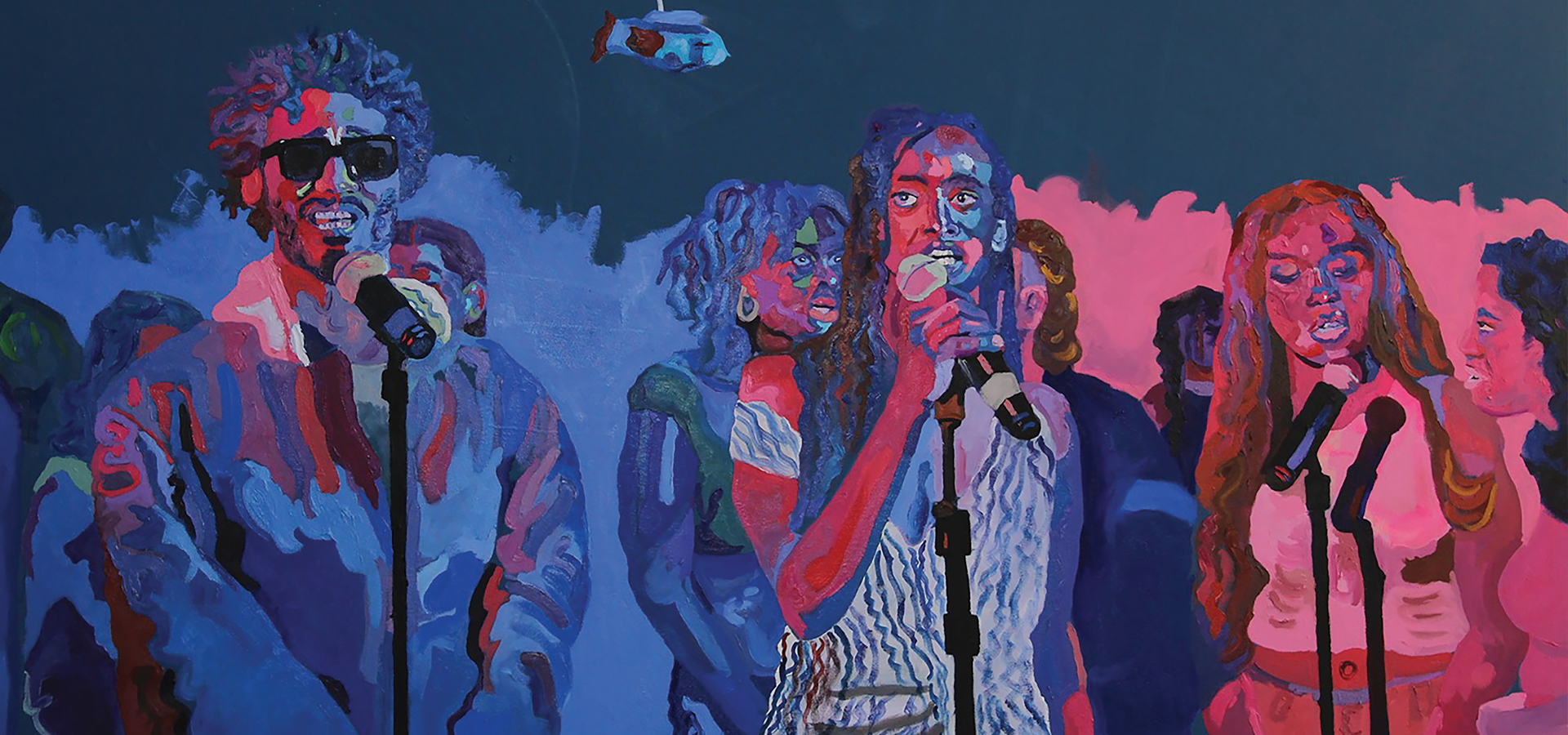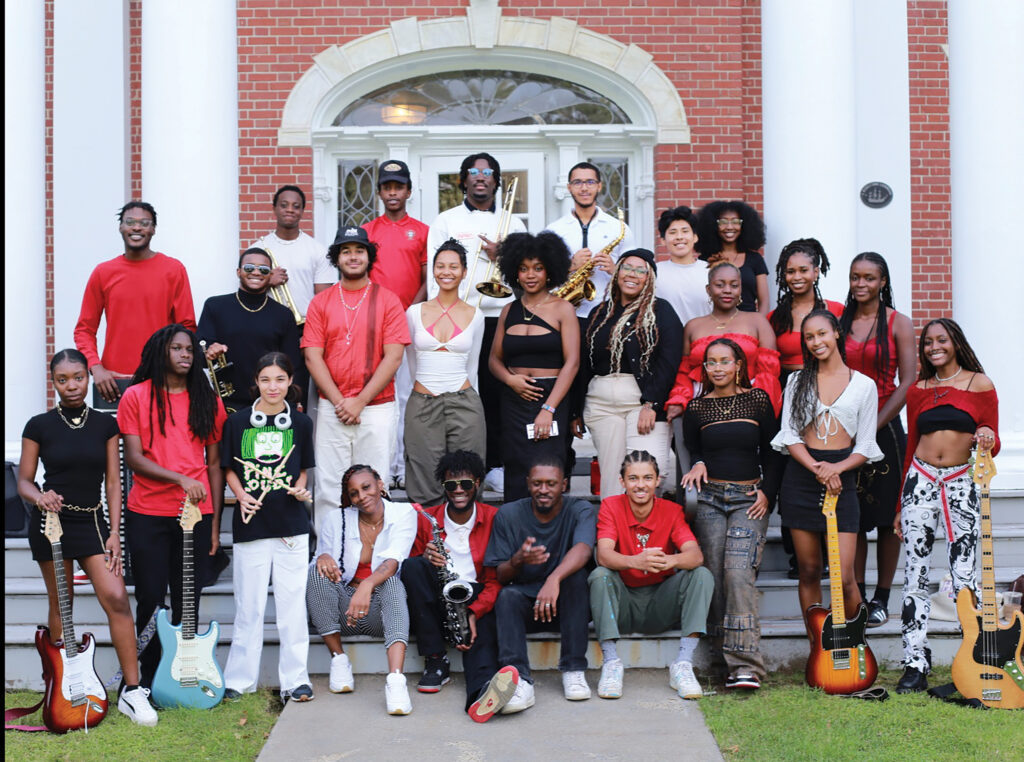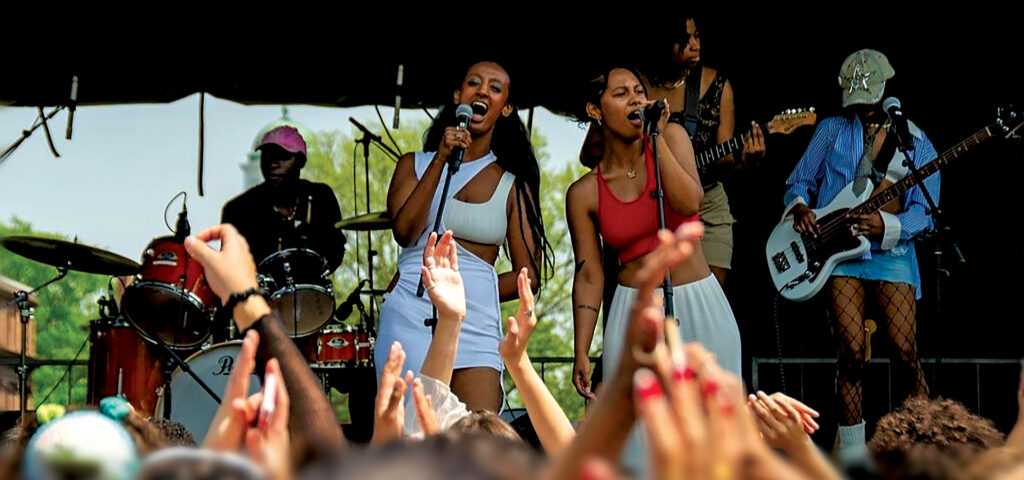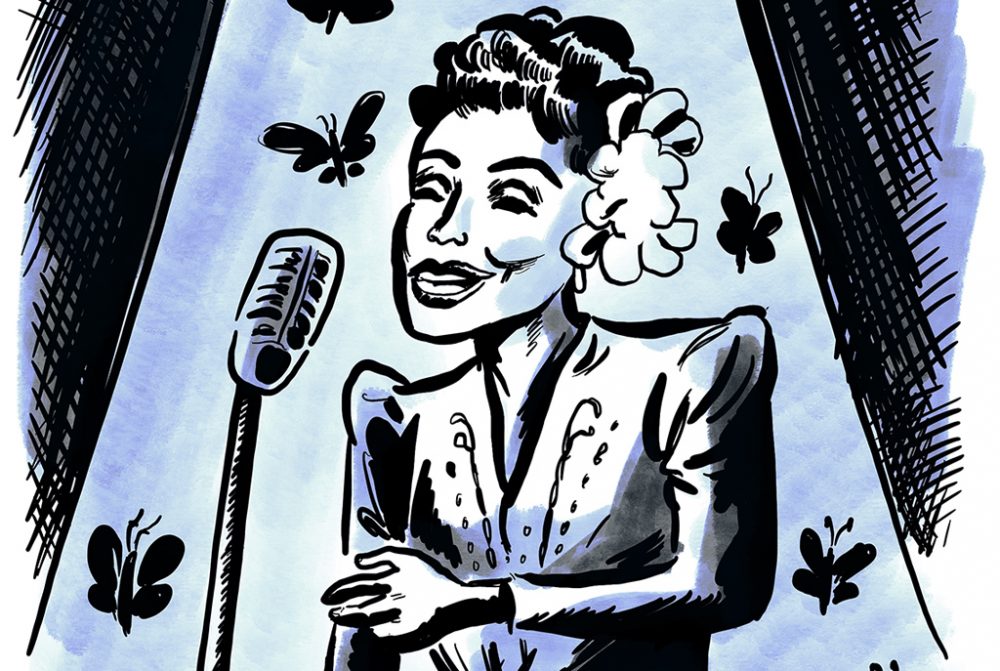Black Raspberry: An Oral History

A creative force has rapidly been gaining momentum on campus. A music group about more than just music. An artist collective that does more than just showcase art. Black Raspberry, an all-Black student collective of 27 members (at last count), has quickly established itself as a focal point for creativity and a new platform for celebrating the many facets of Black identity and expression on campus. Here, Black Raspberry members talk about the explosive growth of the collective—and how music was just the beginning.
THE BEGINNING
Christina Onuzuruike ’24 (Co-founder, creative and structural advisor, vocals): Black Raspberry began in the dorm rooms of Malcolm X House in 2022. Neo and I actively were thinking about what a music group/band would look like on campus if there were an investment in Black talent. What could a group look like with Black instrumentalists, vocalists, and creative directors?
Neo Fleurimond ’24 (Co-founder, president, band director, saxophone): In my music life before college, I was at Brownsville Eagle Academy in New York, an all-boys school for young men of color. We [had] one of the best-ranked high school bands in the country. We were focused on brotherhood and passionate about music. That was the beauty of the space, just being able to put your soul and your all into the music and the community. The positive energy that that brought was so fulfilling. When I came to Wesleyan, not having that was hard.
Christina: Whether a student majored in music or had never been in a band before, Black Raspberry felt like an incredible opportunity for creative exploration and discovery. To provide funky R&B tracks to students, staff, and faculty while reconceptualizing and adding our flair to the music we perform.
Neo: I had noticed a lot of Black instrumentalists and creators around campus. Pelumi [Sokunbi ’25], I just saw a video of him playing drums and was like, Hey, you want to join my band? And Alise [Mackey ’24], who lived at X house and played saxophone. I was like, Hey, you wanna join my band? I did that for a long time. Jalen [Richardson ’25] was just playing his trumpet by himself in front of Olin—and I just gave him a little text: Hey, you want to join my band?
Kailer Brothers ’25 (fashion/wardrobe director, bass guitar): Neo and I lived in Psi U together. I had a ukulele and I would practice in my room. I had also taken cello growing up. And he was like, You should join my band. You’d probably be good at bass because it’s kind of similar.
Neo: Kailer started learning the instrument really quickly. She was amazing and really committed. We have so many other students like that, taking courses, taking private lessons, even though we’re not getting paid for this. It’s just so much passion, honestly.
Jazmin Davis ’24 (vice president, guitar): Neo reached out to me over winter break 2022, after I had just finished my fall semester abroad in Paris. Their guitarist at the time was about to go abroad herself the following spring, and he recalled that I also dabbled in the instrument when I lived in the 200 Church program house freshman year.
Kyla Danquah ’25 (film, vocals): When Black Raspberry first started off, it wasn’t about needing structure. We didn’t need to have a drummer or the guitarist. Even though we did have those roles, it was really just about, anybody who wanted to play music with Black people could play music with Black people. Which is exactly the kind of space that we were wanting: a non-curated space for freedom of just music people. We agreed on things, for the most part, as a group, and that’s what was really fun about it.
Jazmin: At first, I was reluctant because I previously had limited experience playing music in established spaces with actual musicians at Wesleyan. However, I figured that a few jam sessions here and there would be the perfect way to dip my toes into the scene. What I thought would be a low-stakes commitment turned out to be an all-consuming and transformative journey
PUTTING IN THE WORK
Neo: We had our first meeting in October 2022 and I was really shy. We had about 15 people. Being a director was like a test I never imagined I was going to take. I had to learn a lot on the spot. I was arranging on a saxophone by ear and teaching everyone individually, from vocalists—this is before Nolan was our choir director—to the rhythm section and the horns. It was a lot, but they saw how much I love making music and how much work I put in for them to just see the infinite possibilities of creativity.
Kailer: We would go to the practice rooms in the basement of Usdan. It was very relaxed and very exploratory at first. A lot of the music that we played was by ear until Neo started composing. It’s kind of crazy, his brain. He would compose different parts for different songs that we were interested in and then teach it to us individually. And then we would all come together and learn our parts together and just make music.
Langston “Woody” Woody ’25 (audio engineer, vocals): It was Neo calling people to Psi U, where a lot of the practices originally were held, after everyone was getting off of work, coming back from dinner. The first floor was full of instruments: keyboards, saxophones, trumpets. And for two to three hours every night, we’re practicing different compositions—vocalists, horns, the full band or just certain sections—and it was a full-time job after that point. Everybody started to hold each other accountable. When we started incorporating dancers, the dancers were holding the vocalists accountable so that they could understand the cues. We all just started to understand what we needed from each other, and it grew from there.
Neo: We had our first performance at Mic Check and it was beautiful. That was the first time we got on stage and we looked like a band. Did we sound like a band? It was rough because not only were there nerves, but the sound co-op didn’t know how to handle a band that big: We had three horns, one piano player, two guitars, a drummer . . . It was super cramped. But the following week, we had our Duke Day performance and we fixed a lot of our mess-ups from the previous performance. We played “I’m So into You” by SWV and Lauryn Hill’s “Doo Wop” and “Ex Factor.” And it was like Ohh shoot. This is a band. The entire WestCo Café was filled up and people were just so hype and excited to see something new.
WHAT’S IN A NAME?
Neo: Christina and I were in the hallways of X House, just singing, and she was like, Hey, let’s call it Black Raspberry, it’s my favorite ice cream from Usdan! I was like, Well, all right. I’m pretty bad at names, but we can rock with this.
Christina: I genuinely loved the black raspberry ice cream flavor served at the Usdan cafeteria. I also believe the name exemplified all the characteristics of Black Raspberry—smooth and rich.
Neo: It just started as a joke, like: ice cream. But now, it’s escalated as institutional empowerment for Black creatives. Passion plus resources plus support and recognition. When we all put our passions and talents and love and joy—all these little things that make us human—together, then it gives us this infinite realm of possibilities for creativity.
Woody: In the winter of my sophomore year (2022-23), I stayed on campus for a winter session class. Neo also was staying, and Black Raspberry was having rehearsals and auditions. Pretty much everybody was being taken in at that point, trying to just make the group as dynamic and as fun as possible. But [by] spring, the intention started to be to build a family dynamic amongst the members, and realizing that this is something that was needed. We didn’t realize how badly we needed a group of talented students of color.
PERFORMING
Neo: February 2023 we performed at Jubilee with a professional sound setup. Everyone was on the same page, like, Alright, this is the highest stakes we’ve ever been in and if we mess this up? . . . We had other students from other schools coming in. We had, like, you know, faculty watching. It was do or die.
Jazmin: There was a pivotal moment when Neo gave us a motivating speech about tapping into our energy and connection to not only the music and our instruments, but also to one another. After urging us to play as though we were performing—with the added pressure of a videographer capturing the moment in its entirety with high-quality equipment—I noticed a shift in the space. Although the run-through wasn’t perfect in terms of hitting our cues and correct notes, it still felt so distinct from our attempts from earlier in the rehearsal. We were no longer focused on the pursuit of musical perfection or the gravity of our looming performance, but rather the convivial experience of tapping into our own and feeding off of each other’s energy in order to create evocative music together in the present moment.
Neo: We clutched it, honestly. We’d only been together for three months and what we were able to execute within that? It took a lot of pieces, but that gave us momentum riding into Spring Fling. [The group competed in the annual Battle of the Bands competition beating out 11 other campus groups to perform at Spring Fling in May 2023.]
Judeley Jean-Charles ’24 (vice president, rhythm section leader, keyboard): Spring Fling solidified just how much of a band we had become and the strength of how much work we put in. Sound check was going late for some reason, so we started late. We were only two songs in and then the sound people were like, Hey guys, you need to leave now. We all were looking at each other. It felt like slow motion. I don’t know if it was 6 seconds, 30 seconds. And then I was like, I’m not going to allow us to have worked so hard for us to not even perform our full songs. So I started playing the next song. . . I was scared and nervous, but I just kept going and everybody just came in after. Everybody knew, like, OK, we’re not getting off this stage until we finish our songs. And the crowd loved it; everyone was giving us so much energy. It was beautiful. It was my favorite moment.
Neo: It was our biggest performance up until then and we were the opening act. Even with the headliner that they brought in, we had a higher crowd turnout. We were just like, Guys, we low-key have potential.
BECOMING A COLLECTIVE
Neo: Initially we started off as just a band, but more and more I started to see points of all forms of expression, specifically for Black artists. I started to see that there is definitely a niche in the community of creatives on campus that want to empower themselves.
Woody: Everybody in Black Raspberry has this fire to them, independent of joining the group, and that is what pushed us so far in such a little time. Everyone had such big dreams for what Black Raspberry could mean—to them, to the culture of music on campus, to the overall acceptance and embracement of Black art. Neo took that very seriously and he tried to reinforce that. Since then, I feel like his biggest mission before graduating is trying to make sure that it’s something lasting and something that can be passed on and continue to grow.
Jazmin: By definition, an “arts collective” is a group of artists who share their unique perspectives and gifts with one another to collaborate on artistic endeavors, share resources, and support each other on their creative journey. Black Raspberry shifted from a “band” to a “collective” once we decided to lean into the multi-dimensional identities and talents of our members and expand our scope, from strictly performing covers to writing and producing our own music, filming documentaries and music videos, curating fashion shows/lines, establishing a management and business team, and fundraising for causes that aligned with our own ideologies. It not only ushered in more possibilities and avenues of expression for the members, but also fostered an affinity space for Black and other students of color both on and off campus.
[O]nce we decided to lean into the multi-dimensional identities and talents of our members and expand our scope . . . it not only ushered in more possibilities and avenues of expression for the members, but also fostered an affinity space for Black and other students of color both on and off campus.
Jazmin Davis ’24
Woody: The collective came into play when we realized that we’re not just musical artists—a lot of us have much more dimension than that—and Neo realizing that he wanted to honor that. Along with that came the collective mindset of: We are all Black Raspberry. From wardrobe to the graphic design team, the board . . . everybody has this talent that’s highlighted under this large umbrella. There’s space for everybody.
Nolan Lewis ’25 (vocal section leader/choir director): The music that we do has been feel-good, classic hits. Now that we’ve established that, we’re moving into a bit more exploration but still recognizable. There is a heavy emphasis on collaboration— not just in recommending songs, but when actively working them out, everyone is offering suggestions. And now they’ve been having songwriting sessions with Ellis [Carter ’25] and the goal is to one day be 100% original songs.
Neo: We started working on a mural project in X house this semester. That was directed by Aisha [Odetunde ’25]. We saw that X House was being underutilized as a space for community engagement. Back in the ’70s and ’80s, X House was an HQ for so much, but post-COVID that got lost. The space started being like a dorm more than a home. If we could make this an HQ for arts for Black individuals, it would bring in so much community. So we moved the band from Psi U into X house. We have all our equipment over there and we are painting the walls so that when we get together it’s a lot more colorful.
[W]e’re not just musical artists—a lot of us have much more dimension than that . . . We are all Black Raspberry. From wardrobe to the graphic design team, the board . . . There’s space for everybody.
Langston Woody ’25
KEEPING IT GOING
Woody: Neo’s always super intensive when it comes to the band members and board members figuring out what people need and how he might be able to get them. And really, he always ends up figuring out a way. Just trying to build that sense of community. That’s where the resourcefulness comes from: we’re able to see that there’s always something, it always gets done, some way, somehow.
Neo: We’re scavengers. We’re really good at scavenging.
Woody: I’ll have studio sessions in my room. Every other day, someone from the band will come in and record an instrument section that they want to be able to rehearse before a performance. Or a vocalist will come in and do their runs. Just anything.
Neo: We have our production and composition team set up in Red Feather. Ellis and Judeley have set up their own production studio. They’re trying to get that started up so that we can make live music, record it, and stream and showcase this art to other people.
Judeley: Red Feather Studios is student-run and is for students to use, but I don’t know if people, especially students of color, know about it. I got in it last year and realized this is such a beautiful space that can be utilized, let me show more people. It is pretty rundown, but it’s a great space and the potential of it is very big.
Neo: There are a lot of other students that are as talented and as invested in music as I am. Everyone has their gifts and talents, but work beats talent. I know talented people who don’t work hard, so I want to showcase that it doesn’t matter where you come from, it doesn’t matter your situation. If you love something, if you really follow the things that you’re passionate about, you can achieve those dreams. Just keep working. I think the story of Black Raspberry is a story of love and hard work.
Lasting impacts
Woody: All of us are in college and experiencing these same feelings of trying to discover ourselves. But Black Raspberry was a place where I didn’t feel like I had that question anymore. I didn’t feel like, Am I still trying to figure it out? I felt like I knew. I was assured of what I could do, what my abilities were, and now I had a goal in my mind to achieve. Black Raspberry catapulted my confidence as a Cardinal, really. The best parts of Wesleyan for me were involved in the experience of being able to find a community like Black Raspberry. I’m not on any sports team. My presence on campus, for the most part, has been defined by music. I’ve been able to discover myself as an artist—I know for sure I am an artist. I’m a creator because I’ve had the opportunity and the privilege to be in a group where it’s taken seriously and it’s reinforced. I don’t question it. I just try to embody it.
Kyla: I lived in Ghana, and coming to the United States for the second time when I was older was a big moment of clarity for me, to take my Blackness as an identity that I care about. Coming back here to this predominantly white institution, I realized for the first time that my Blackness is something that mattered to me way more, because it was about curating spaces for Black people that I never really had because I never really had to care about it. Black Raspberry is a very important place for me because it’s a space for Black people by Black people. And it doesn’t feel inorganic. I think we have to stress organic community building. You can’t force a community to come together. But if people just want to make that community happen, people are going to do it and that’s what Black Raspberry feels like.
Emmett Favreau ’26 (vocal): I think that it’s given me a very good social outlet and also has given me a performance platform that feels high-level and professional at Wesleyan. The fact that I’m able to find that in a school setting is really cool to me.
Nolan: Black Raspberry offers a unique space for me, especially because I came early decision and the student music that I was involved in was a cappella. I haven’t really had spaces where it’s a majority people of color who are also artistically oriented. So having others who are not just people of color, but who are the same color as me. . . there’s a shared experience combined with the shared passion and drive for music that occupies a space that I have not felt anywhere else, and I’m super appreciative of. Emotionally, it fulfills something.
Black Raspberry allowed so many people, me included, to dream bigger and allow ourselves to realize that we don’t have to conform to anything. You can create and find spaces of joy and creativity, and not just in a certain straight, narrow path.
Judeley Jean-Charle ’24
What’s next?
Neo: In spring semester (2024) we have our first theater production. We’re going to be working with Lincoln Turner ’25 in the ’92 theater. He’s putting on a play and we’re going to be the live band for it. That’s going to be a whole different genre and ecosystem of creativity for us. Beyond that, there are a lot of things I want to do, and trying to pinpoint one is hard. I have so many dreams, including making a Black Raspberry Academy, where we bring kids who are passionate about music but don’t necessarily have the resources and teach them music. If that were a possibility, that would be amazing. We just actually performed for a children’s program at Traverse Square, and it was phenomenal and heartwarming and wholesome—every positive adjective I can think of—just to see the kids be inspired by musicians, but musicians that look like them.
Nolan: A lot of the current leadership will be graduating this year, so power will be more widespread. In the process of restructuring, the ambiguity can be a little scary, but also very exciting. Neo has done a good job establishing the foundations to further grow roots not just at Wesleyan but with the actual surrounding Middletown community. So we’re on the way to getting the foundation there to establish longevity. We’re not going to go away. Ohhh no. That’s not happening.
Judeley: Black Raspberry allowed so many people, me included, to dream bigger and allow ourselves to realize that we don’t have to conform to anything. You can create and find spaces of joy and creativity, and not just in a certain straight, narrow path.
Kailer: I want to draw in as many people as possible. Like, I want it to be a beacon of community, and that’s something that’s really been happening this year. There are a lot of new members that are freshmen and sophomores, and I want that to continue to proliferate, because I know I’ve gained so much knowledge from being in Black Raspberry. I want that to trickle down to other grades and new people.
Kyla: It’s going to be huge transition for us, and it’s going to be really fun to start a new moment for us to figure out everything. I don’t really know what’s in the future. I’m excited for it to look different because I think every year is a fun new idea of, how far can we go? How much more can we do? How much less can we do? What other things can we change? I think that’s the best part about transitions: giving the reins to another group of people to figure out what they want to do.
Neo: Black Raspberry, as it is now, isn’t the end of Black Raspberry. It honestly just feels like the beginning for us. I’m excited to see where that goes, and I hope that everyone can just keep on supporting us and I’ll continue working hard to put on great performances, and make sure that we are seen, heard, and felt in all areas of music and art.
Though the group members are full-time students, many juggle multiple artistic projects both individually and with others within and outside the collective, including published pieces or working with established artists. Follow @blk.raspberry on Instagram to stay up-to-date with the latest on group activities.
Top: A Taste of Black Raspberry. Oil on canvas. Leevon Matthews ’23





